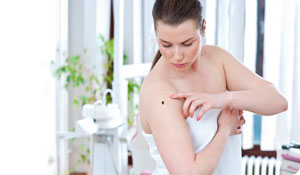
Skin cancer is the most common type of cancer in the United States, but it's also widely misunderstood. Exposing the myths and taking action can go a long way in keeping you and your loved ones safe.
There are two types of skin cancer: non-melanoma (basal cell and squamous cell carcinomas) and melanoma. Non-melanoma skin cancers are more common. About one million Americans develop this type of cancer every year. Melanoma is less common, but more deadly.
Myth: Sunscreens with higher SFPs provide more protection against skin cancer
Fact: Above an SPF (Sun Protection Factor) of 50, the additional protection from sun damage is negligible except at high altitudes.
SPF only measures Ultraviolet-B (UVB) radiation, not Ultraviolet-A (UVA). Both cause cancer. Dermatologists recommend using a broad-spectrum sunscreen, which protects against both types of radiation, of at least 30.
Myth: Skin cancer only occurs on skin directly exposed to the sun
Fact: Skin cancer can occur anywhere on your body. It's important to do regular self exams to look for abnormal moles or unusual changes on your skin. Don't forget your back, scalp, genital area, and between your buttocks.
Myth: Having dark skin protects you from skin cancer
Fact: People with dark skin have additional protection because they have more melanin, which filters UV radiation. However, people of color can still get skin cancer and should take safety precautions. Unfortunately, when dark-skinned people are diagnosed with skin cancer, it's typically at an advanced stage.
Myth: Using sunscreen provides adequate protection against skin cancer
Fact: SPF is a formula that tells you how long you can safely stay in the sun using the sunscreen. Multiply the SPF by how long it takes you in minutes to burn without protection and you have a guideline for how much sun exposure you should have.
Sunscreens should be one component of a multi-pronged sun safety strategy, which should also include wearing protective clothing (hats, sunglasses, long sleeves and pants, and clothes with built-in SPF), limiting your sun exposure, and avoiding the sun during peak hours—from 10:00 a.m. to 2:00 p.m.—when the sun's rays are the strongest.
Apply sunscreen liberally and frequently, especially after swimming or sweating. An average size adult needs an ounce of sunscreen for optimal coverage.
Myth: Indoor tanning is safer than tanning outdoors
Fact: This may be the most dangerous myth of all. Indoor UV tanners are 74 percent more likely to develop melanoma than people who have never tanned indoors. Young people are particularly at risk. Avoid indoor tanning.
Myth: Rates of skin cancer have declined thanks to sunscreens
Fact: Unfortunately, this is false. The incidence of non-melanoma skin cancer increased dramatically between 1992 and 2006, leading dermatologists to call it an epidemic.
Sources:
"Dramatic Increase in Nonmelanoma Skin Cancer." Medscape Medical News. Web. 24 March 2010.
http://www.medscape.com/viewarticle/719091
Boyles, Salynn. "Group Calls Some Sunscreens 'Snake Oil'." Medscape Medical News. Web. 25 May 2010
http://www.medscape.com/viewarticle/722390
National Cancer Institute. "Skin Cancer." Web.
http://www.cancer.gov/cancertopics/types/skin
National Cancer Institute. "What you need to know about Moles and Dysplastic Nevi." Web. 16 September 2002.
http://www.cancer.gov/cancertopics/wyntk/moles-and-dysplastic-nevi
National Cancer Institute. "Melanoma." Web.
http://www.cancer.gov/cancertopics/types/melanoma
National Institutes of Health. Medline Plus. "Skin cancer." Web. 12 August 2009.
http://www.nlm.nih.gov/medlineplus/ency/article/001442.htm
Skin Cancer Foundation. Web.
http://www.skincancer.org/
Lowry, Fran. "High SPF Essential at High Altitudes to Protect Against Sun Damage." Medscape Medical News. Web. 8 March 2010.
http://www.medscape.com/viewarticle/718092
Bradford, Porcia T. "Skin Cancer in Skin of Color." Dermatology Nursing 21(4) (2009): 170-77; 206. Medscape Medical News. Web. 23 November 2009.
http://www.medscape.com/viewarticle/712363





